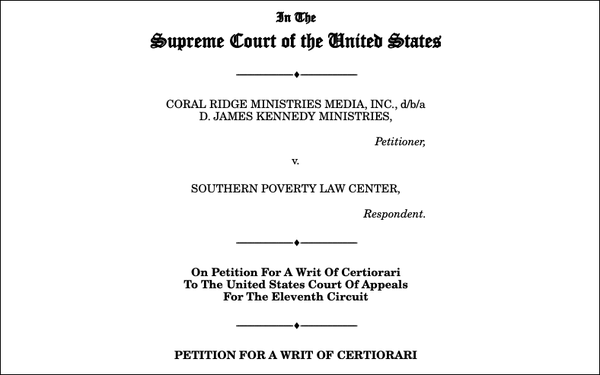Supreme Court Urged To Reject Church's Request To Reconsider Libel Standard
- by Wendy Davis @wendyndavis, February 9, 2022

The Southern Poverty Law Center on Wednesday urged the Supreme Court to reject a church's request to reconsider longstanding precedent requiring public figures to prove “actual malice” in order to prevail on defamation claims.
That nearly 60-year-old principle “occupies a foundational place in the constitutional firmament that has only become stronger with the passage of time,” the civil rights group argues.
The “actual malice” standard dates to 1964, when the Supreme Court ruled in New York Times v. Sullivan that public officials who sue for defamation must prove that the speaker either knew the allegedly defamatory statement was false, or acted with reckless disregard of the statement's falsity. Later rulings established that the same standard applies when public figures sued for defamation.
In the last two years, at least two Supreme Court Justices -- Clarence Thomas and Neil Gorsuch -- have said they think the court should reevaluate the 1964 holding.
The Southern Poverty Law Center's papers come in a dispute with the Coral Ridge Ministries Media, which sued in 2017 over its designation as a “hate group” due to its position on homosexuality. Coral Ridge also sued Amazon, which allegedly refused to allow donations to the church through the “Amazon Smile” program, due to its designation by the Southern Poverty Law Center as a hate group. (Coral Ridge says it "opposes homosexuality," but “has nothing but love for people who engage in homosexual conduct,” according to court documents.)
U.S. District Court Judge Myron Thompson in the Middle District of Alabama dismissed Coral Ridge's lawsuit on several grounds, including that there is no one definition of the phrase “hate group.”
Therefore, Thompson wrote, the statement that Coral Ridge was a “hate group” was not provably false, and couldn't serve as the basis of a defamation lawsuit. Statements, even if disparaging, can only be defamatory if they are verifiably untrue.
Thompson also said in his ruling that Coral Ridge was a public figure -- meaning it would have to prove “actual malice” to prevail on a defamation claim.
Coral Ridge appealed that ruling to the 11th Circuit, which upheld Thompson's decision.
Coral Ridge then asked the Supreme Court to take up the dispute and reconsider the “actual malice” standard.
“This Court’s 'actual-malice' standard, invented for a particular time and a particular purpose, has become obsolete and does not serve any of the interests it was designed to protect by limiting private individuals from bringing defamation claims against other private companies or individuals,” the church wrote in a petition filed in November.
The church added that the standard has given media companies “virtual immunity” from libel lawsuits.
The Southern Poverty Law Center and Amazon both initially waived their right to respond to the petition.
But last month the Supreme Court took the unusual step of requesting a response to Coral Ridge's request.
The Supreme Court rejects most petitions for review, but a decision to ask for a response increases the likelihood it will hear the case, according to a 2018 analysis by Bloomberg Law.
The Southern Poverty Law Center said in its Wednesday filing that Coral Ridge's lawsuit offers “a poor vehicle” to reconsider the actual malice standard.
“An independent alternative basis supports the outcome below: the challenged statement is not provable as false and therefore not actionable,” the civil rights group writes.
The organization also says claims that defendants in defamation lawsuits have immunity against claims by public figures is “empirically inaccurate,” noting that celebrity Cardi B recently won a defamation lawsuit, and that former Alaska Governor Sarah Palin is currently suing the New York Times for defamation.


